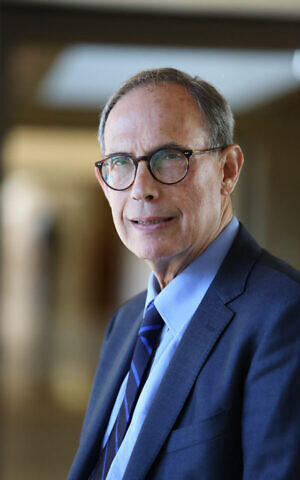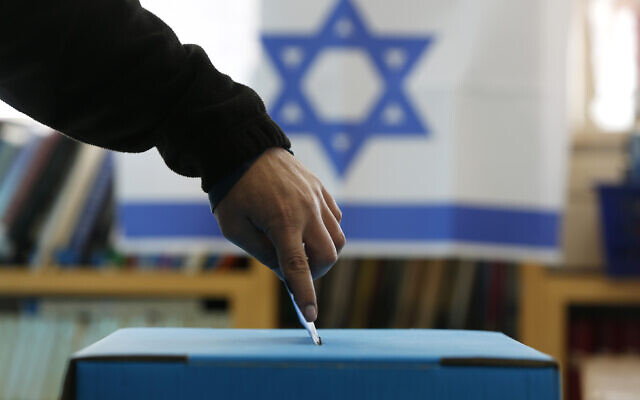39 Parties Will Compete in Upcoming Election
The March 23 Israeli elections will be the fourth elections in less than two years.
It’s déjà vu all over again.
– Yogi Berra
American Jews can be forgiven if they feel they have repeatedly heard about Israeli elections. On March 23, Israeli voters will return to cast their ballots for the fourth time in less than two years.
In elections held in April 2019 and again in September 2019, the results were so split that no party was able to cobble together a majority coalition government. In March 2020, the Blue and White Party upset its voters by joining a coalition with Prime Minister Benjamin Netanyahu’s Likud Party. That power-sharing government collapsed after failing to agree on a national budget by a Dec. 23 deadline.
So, now there’s a fourth attempt to attain a functional government. But this time, there are some differences. Most notable for progressive American Jews, an Israeli Reform rabbi, Gilad Kariv, could be elected to the Knesset. If that happens, that means his party, the venerable Labor Party that led the country from 1948 to 1977, returned from the almost dead after some Israelis had already announced its demise.

And, if Labor really attracts a lot of voters and grows beyond the current expectations, a former Emory University visiting faculty member, Nachman Shai, could return to the Knesset. He is number eight on the Labor Party list. Currently visiting faculty at Duke University, Shai served in the Knesset from 2009 to 2019. He taught at Emory from 2019 to 2020.
“It’s hard to make projections” about the election results, understates Eli Sperling, the Israel specialist for the Center for Israel Education at Emory University, now also a postdoctoral associate at Duke University. “Rarely do Israeli governments survive their full four-year terms.” A fifth election is likely, as it is just a question of when, he added.
Thirty-nine parties are vying for the Israeli vote.
According to professor Ofer Kenig, a researcher at the Israel Democracy Institute in Jerusalem, the “lowest number of factions” ever elected was eight – last year.
“This low record is not expected to be maintained this time. Based on recent polls, out of the 39 lists registered to run, between nine and 14 are expected to pass the electoral threshold necessary to enter the Knesset.” That threshold is 3.25 percent of the valid votes.

Kenig said surveys indicate that at least five lists are in danger of not reaching that threshold: Meretz, Religious Zionist Party, Ra’am, Blue and White and the New Economic Party.
“We are seeing more pronounced fault lines and long-standing tensions in Israeli politics,” Sperling observed. “But the left-right divide is more amorphous.” Like the recent elections, the biggest question is which parties would agree to join a Netanyahu-led government. Even those party leaders who insist they would not agree to enter a Netanyahu government are doubted after Blue and White Party’s leader Benny Gantz made the same promise before the last election, and then broke his pledge.
“This is a unique time in Israeli history,” Sperling said. Because of the coronavirus pandemic and resulting economic downturn, the domestic existential concerns are even outweighing external existential threats like Iran, he said. “And Netanyahu has used the pandemic to create an economic populist campaign.”
Unlike in recent elections, Netanyahu has also reached out to Israeli Arab voters, resulting in the four-party Joint List dissolving into a three-party list with the fourth competing on its own. He also maneuvered the joining together of far-right parties National Union and Otzma Yehudit. Two years ago, a similar merger was condemned by both the American Jewish Committee and the American Israel Public Affairs Committee because Otzma was founded by the late Rabbi Meir Kahane.
AIPAC called it a “racist and reprehensible party.” The merged party this time around also includes the Noam party, which is almost exclusively focused against the LGBT community.

“Netanyahu is a tactician,” Sperling said. “First and foremost, he’s focused on his own political survival. This election is Netanyahu versus everyone else. He’s trying to play every angle he can.” Sperling pointed out that the prime minister even visited the Christian community in Nazareth recently. “Traditionally, Netanyahu has rallied against the Arab voters. This is a new approach, which may be pragmatic.”
Sperling refers to Netanyahu’s political survival because the prime minister is currently on trial in three cases on charges of bribery, fraud and breach of trust.
Like any election, this one again will be determined by who comes out to vote for whom. Sperling said voters may be fatigued, but so may the politicians in this unprecedented fourth election in less than two years.




comments